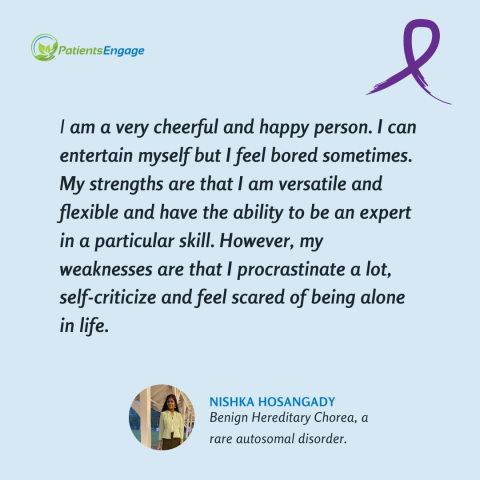
After running from pillar to post, the Hosangady family finally found their daughter’s diagnosis of a genetic and rare disorder termed Benign Hereditary Chorea. That was 7 years ago. Today Nishka is a young woman living her life and reaching new goals every year. Nishka’s mom tells us how they found ways to help her flourish.
Nishka is 23 now and grown into a beautiful young lady.
How were her adolescent years?
Nishka has normal cognitive functioning. However due to the genetic anomaly at age 8, her speech became unintelligible and she manifested motoric issues which impacted her right hand and she wasn’t able to write. We had to make a decision to move her to special schools. We found that special schools may not be suitable to neurodiverse children with their unique challenges. In Nishka’s case for instance she was forced to write even though her motor functioning was weak due to dystonia. This affected her confidence and she did not want to mix with other children in her school who had issues but not necessarily with speech. The loss of speech impacted her to a point that she became a loner and preferred to watch TV and be with herself.
What were her teenage years like? What challenges did she face as puberty hit?
There were psychosocial issues due to her disability. She had a lonely childhood which crept into her teenage years. At the family level she was well adjusted but couldn’t get herself to join peers. We were constantly trying therapies and every kind of treatment to help restore her speech and motor issue which was more prominent in her right hand – she could type with her left and make herself understood. We also tried a home program where I had to learn therapies from an institution in Philadelphia in the US. It was an extremely intensive program which had to be done 24/7 and 7 days a week. We went through a lot of physical training, masking for better lung functioning, intellectual program of learning, nutrition that would improve brain function and a host of other things that the institute taught us which we would do at home. We literally turned our home into a rehab centre for 18 months !
The last time you told us she was in Gateway School. How were her final schooling years?
The Gateway School had a great team of special educators and also a good occupational therapist who to a large extent helped to get Nishka out of her trauma of losing her ability to communicate clearly and fine motor functions. They were trying to follow an international curriculum but did not have a clear direction of how to conduct exams for special children etc. Since Nishka was almost 16, we were keen that she finish her 10th grade exams through the National Open University. We therefore enrolled her at the Citi Academy School at Haji Ali where the NIOS program was being successfully used. Children could do their exams over a two year period. She did very well and achieved a great result. At this point we felt she could shift to a regular junior college for her 11th and 12th. She was able to secure a seat at Sophia College due to good marks in her 10th Board.
How did her 10th and 12th boards exams go? What were some of the challenges she faced while taking these exams? How did you overcome them?
For her 10th board she had to use an iPad to type her answer. The answers were then transcribed on paper by a writer. We sought help from the director of NIOS as Nishka needed 2 permissions to write her exams, use of I pad and help of a writer. It took me weeks of trying my best to achieve this and finally permission from the top boss helped in securing the required permissions!!
It was the same story for her HSC exams, I had to reach out to the Director of The HSC board who met me in person to understand why she needed a writer. I had to explain that since her speech was unintelligible the only way the exam could be possible was if she typed her answers on the I pad. They did not have the required digital access to directly send her answers so therefore we had to get writers for every exam. They had to be ferried to and from to the exam centre. As a matter of fact , Nishka became a celebrity of a kind as hers was the first case where something like this had been done. As she reached her examination centre , there were scores of reportersfrom the media all waiting to get a picture and story of this very special student!
How were the challenges different at college level?
At Sophia College I had to appraise the Professors of her unique issues. They were quite empathetic. Fortunately after her 12th, the tests and exams could be answered digitally and she would use her laptop and mail the answers and assignments. There was a lot of higher level thinking required andc ollege level was definitely tougher – we had assistance by way of tutoring to help her all throughher academic life. She loved college life and managed to make a few friends who empathized with her. But most of the girls simply looked at her as someone special and they were far too busy getting on with their interests and aspirations to really bother with including her in their social circles.The 2nd and 3rd year was reasonably easier as Covid 19 had struck and therefore college was now online. It actually benefitted her as all exams had only multiple choice questions rather than lengthy answers.
In your opinion, how can the system change to be more inclusive?
There has to be more information and sensitization by the government at every academic institution to help understand neurodiverse population. The understanding is minimal and therefore does not allow for special needs children to integrate well. Most special needs schools are running with the passion and hardwork of a few dedicated individuals. These are restricted to urban cities. They are not enough to cater to the larger population in smaller towns where special needs are not identified and children are ignored as they have no facilities or resources to educate them. Special Ed needs a special directive and funds to reach children who unfortunately have no means.
What is Nishka doing now?
Nishka finished her undergraduate studies with distinction at Sophia College. We are currently sending her to an institute called Skill Shakti where special needs children and adults learn life skills and they also help them to discover what they’re best at. Skill Shakti has good networks whereby they help with future employment as well.
How has her development been physically, psychologically and emotionally? In what ways has she progressed or regressed?
The attention to physical and mental wellbeing has been continuous in our journey. Be it speech therapy, alternate therapies like acupressure, acupuncture craniosacral, ayurvedic massages and treatments, Psychotherapy, Reiki and Pranic healing techniques, possibly everything that was suggested that might be helpful!
Today I see Nishka as a well adjusted adult. She continues to have issues with her speech and writing but overall she has come out a winner with success through a good academic result and we are sure she will get a job which she will be happy doing.
What helped build her confidence?
All the therapies put together especially the psychotherapy and constant encouragement from us but it took years. It was a slow process. We didn’t allow her to feel helpless at all. We kept trying and never gave up. We did not let any hurdle weigh us down and instead channelised it to find solutions.
Is she currently taking any therapy (occupational or physical)?
Yes, she continues to go for Speech therapy. She does Yoga lessons and goes occasionally to the gym too.
Apart from speech and motor, does she face any other challenges?
Emotional issues such as alienation and frustration do exist due to social hindrances. There was some childhood depression because she was unable to express herself then. During her late teens, she could express more and share her concerns.Physically, she has a tendency to get frequent mouth ulcers and constipation. Homeopathy has helped resolve her gut issues very well.
What fun activities does she enjoy?
She loves dressing up and going out. She loves to have a cocktail now and then. She is very active on Facebook and Instagram and love online shopping. She is very connected on social media but there is no offline connection with peers.
What are her future goals?
She would like to join a graphic design company.
Where would you like to see Nishka 10 years from now?
I would love to see her engage with a good social group that she likes to interact with and who valuehaving her as a part of their circle. She has a great level of maturity but is still shy and hesitates to go out unless it’s with her college friend who she trusts who accepts her as she is. She would certainly like a more robust social life.
As a parent, what is your biggest worry?
Strangely I don’t worry because I would rather convert that into something productive that will help Nishka’s progress. Seeing Nishka today does make us happy and full of pride for all the strength that she has shown despite the most challenging and arduous life events. We have celebrated every little success that she’s had and had the joy of seeing her overcome hurdles by the sheer dint of hard work and effort.
Nishka says:

I am a very cheerful and happy person. I can entertain myself but I feel bored sometimes. My strengths are that I am versatile and flexible and have the ability to be an expert in a particular skill. However, my weaknesses are that I procrastinate a lot, self-criticize and feel scared of being alone in life.






